CONTROL
CONTROL
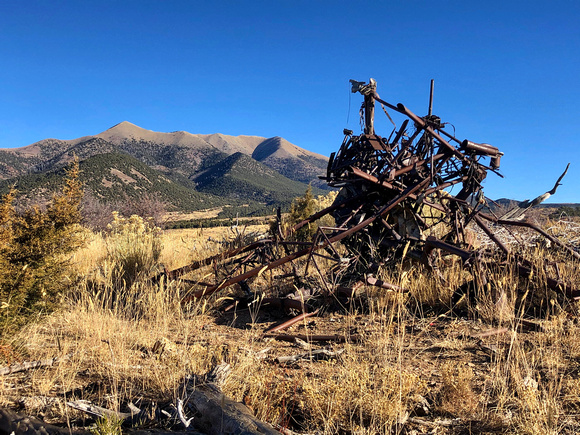

A high overcast cloud layer nearly 8000 feet above the ground dispersed a softened and subtle light over the rugged western landscape below. Wispy lonesome clouds drifted aimlessly beneath the overcast layer as if searching for purpose, while other more mature clouds gathered and started a bombardment campaign against the high desert floor. Scattered like hay bales in a field, the moisture laden clouds released their payload, but the dry arid air beneath thwarted the attack. The evaporating curtains of virga swirled down below each cloud in ghostly patterns of light and dark gray that offered a stunning backdrop to the already hauntingly wild and picturesque scene. Deeply eroded slot canyons with shades of reddish-orange and reddish-yellow sandstone provided a labyrinth of texture and color that added a hint of untamed formidability to the setting. Ahead, through the windshield, the dark hues of blues and greens pockmarked with white described rising terrain with stubborn patches of snow clinging to shaded areas. Even higher, the nearly twelve thousand foot peaks morphed to pure white as the deepening snow from the last storm blanketed everything.
With a quick glance, the pilot scanned his instruments. Noting his altitude and eyeing the mountain range ahead, he altered course slightly south.
The tall dark haired pilot, Colonel Lorin Johnson, sat comfortably in the left seat. He was obviously at home in the air having spent many hours slipping the surly bonds of Earth. Confidently in command, his handsome face showed little sign of worry as he aptly flew the C-45F Expeditor westwards. Also known as a Twin Beech, the two-engined tail wheel aircraft provided a solid platform for light cargo operations as well as pilot training and cross country executive movement. It’s two Pratt and Whitney R-985 engines produced 450 horsepower each, making the aircraft capable of cruising at over 200 miles per hour.
“A grand sight,” remarked an excited Staff Sergeant from the copilot’s seat, named Billy Nash.
Colonel Johnson stole a glance at the young man and grinned. “It sure is Billy.” He paused as he turned his head to watch the precipitous ground slip under the left wing. “It truly is.”
“What was it like?” asked Billy hesitantly after a minute of silence.
“The War?” responded Johnson.
“Yes, Sir.” nodded Billy. “I heard you personally flew thirty seven bombing missions over Germany.”
Johnson nodded and then pressed his lips tightly together. “Nervous tranquility followed by chaotic brutality. Each mission climaxed with flak pockmarked skies, swarming enemy fighters, crippled aircraft, and lost crews.”
“A heavy price,” acknowledged Billy solemnly as he lowered his eyes.
“Prayer-filled anxiety eclipsed by hell,” sniffed Johnson as he consciously dammed the reservoir of memories threatening to spill out.
Acknowledging Johnson’s reluctance to relive the past, Billy changed the subject. “You still have family in Utah?”
Johnson nodded. “It will be good to see all of them. It’s been a few years.”
“How much longer?”
“A little under an hour.”
Billy grinned and scanned the snow capped peaks dominating the majority of the windshield. Straight ahead, a saddle between the tallest mountains offered clear passage but looked deceivingly close. Like horned giants lurking along a narrow forested trail, the mountains threatened to reach out and snatch the sleek fuselage of the Twin Beech as it slipped through the pass. “Thanks for bringing me along. Oklahoma boys like me don’t get views like this.”
Johnson flashed a dashing smile. “It’s too beautiful to see alone. I just wish you were a prettier date.”
Billy laughed. “I’ve got straight teeth. That’s worth something!”
Johnson chuckled. “Yeah. Pretty good for an Okie.”
Suddenly, the right engine hesitated and then surged. Johnson quickly scanned the instruments. Before he could diagnose the problem, the left engine sputtered.
“What is it?” yelled Billy with serious concern etched across his forehead.
“Fuel,” snapped Johnson as he opened the engine fuel primer handle. Both engines sputtered and then lost power. Sickeningly, at the worst possible time in the worst possible location, the comforting throb of the Pratt and Whitney radial engines fell silent. Just as the C-45F started to overfly the saddle between the mountains, the aircraft’s nose tipped down and the altimeter began to unwind. With acute awareness of the terrain below, Johnson pulled back on the controls to hold altitude. Frantically, he hand pumped the fuel-starved engines while still trying to maintain altitude. The Twin Beech obeyed but not without giving away precious airspeed. The nose of the aircraft cycled up and down as the airspeed decayed further and further and Johnson pulled harder and harder. He desperately tried to get fuel to the engines and still keep flying the airplane. The rugged terrain below clawed at the underside of the aircraft. The stubborn engines refused to start. The controls started to feel mushy. The airspeed was barely enough to keep the aircraft flying. “Come on! Stay with me! Just a few more seconds,” Johnson’s mind screamed. The engines popped as fuel dribbled excruciatingly slow into the lines. Then the left engine coughed and sparked for only a moment. It was so close, but the wings couldn’t produce enough lift to counter the weight any longer. Suddenly, the right wing tip dropped, and the aircraft rolled over. The horned monsters, with their craggy and jagged features, seemingly stretched out to grab the aircraft. The hidden details of the pockmarked and rugged terrain peered ominously into the windshield. The Twin Beech with it’s occupants surrendered to the clutches of the merciless monsters. Torn and ripped apart, the aircraft fell into a foreboding lair of trees and rocks and exploded.
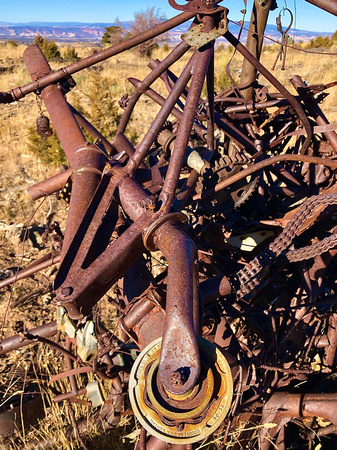



I’ve often wondered about “bad luck”. Honestly, I’ve been perplexed by it at times. It seems to just randomly appear at the worst possible moment and sabotage any and all plans made. It shows up as those unwelcome nuggets that drop into our lives at the most inopportune times. Everyone has experienced them. They are those little devils that pop up in life and make you wonder if God even cares. We’ve all heard about Murphy’s Law that goes something like “Anything that can go wrong will go wrong.” And, it would seem, that Murphy’s Law is astonishingly persistent and able to make things go wrong at the worst possible time. In fact, there are some days that the adage is so prevalent that it makes us regret even getting out of bed. I have heard those “bad days” called many things including the “bludgeonings of chance” in reference to a poem entitled “Invictus”, written by William Henley. In it he wrote,
“In the fell clutch of circumstance
I have not winced nor cried aloud.
Under the bludgeonings of chance
My head is bloody, but unbowed.”
Shakespeare made reference to “bad days” and “bad luck” by calling them “the slings and arrows of outrageous fate”.
Who hasn’t had their heads bloodied?
Who hasn’t been bruised by those slings? Who hasn’t been pierced by those arrows?
For example, a huge family vacation is planned and executed and then somewhere in the middle of Canada, one of the kids comes down with the measles. Are you kidding me? Or the furnace breaks down right when a major snowstorm is on the way and temperatures are forecasted to drop well below zero. Really? Or the sewer line backs up when there is a foot of snow outside and it’s 10 degrees outside. Do you think that would happen in the summer?
Life offers many more “slaps in the face” that include little gems like the family dog dying when you’re on vacation, a highly anticipated job offer is withdrawn, the car won’t start and you’re already late, you finally scrape enough money together to pay off the credit card and then another major expense comes along, construction makes you late for an extremely important appointment, your windshield gets broken the day after replacing it, or your arrow loses it’s nock when you goto full draw on a 350 class bull elk that is only twelve yards away (Yes, sadly, I experienced that heart-wrenching bludgeoning of chance. My head is still bleeding from that one!).
I mean, it’s not like you’re not doing your part. You’re working all the time. You’re busy trying to get things accomplished. You’ve planned ahead. You’ve practiced. You’ve studied. You’ve saved. You’ve tried to counter foreseeable problems that could bite you, and then out of nowhere, the most obscure thing rears it’s ugly head and lands right in the middle of your lap. Now, suddenly, all the plans made go out the window. More time and more money and not enough of either. Lost opportunity, disappointment, rage, stress, and frustration rule the day. Sound familiar?
Personally, I have never believed there is such a thing as “bad luck”. Proverbs 16:33 provides a general reason why I believe so.
“The lot is cast into the lap, but its every decision is from the Lord.”
Proverbs 16:33 NIV
But I would be lying if I said that I haven’t re-evaluated that opinion many times, especially on those “bad days” when everything unravels. It really makes me wonder; Is there such a thing as “bad luck” or is it mostly the perception of “life under the sun”? Asked another way; does everything that occurs, happen for a reason?
Those questions carry deeply embedded opinions. For those that have lost loved ones tragically, how could there be any good explanation for the hurt, pain, and sorrow? To say that things happen for a reason seems insensitive and impersonal in those cases. Is it possible that “bad luck” or “bad things” just happen by chance?
Really, all of these questions can’t be answered until another question is addressed. Is God sovereign? In other words, does God control everything. If He does, then “bad luck” does not exist. In that case, God orchestrates every event and detail in each of our lives. He may MAKE things happen or ALLOW things to happen, but ultimately He controls everything. Chance is not part of the equation. Is that possible or does our free will counter God’s sovereignty? Does our allowed “free will” cause “bad luck”?
Now, do you see why the idea of “bad luck” is so perplexing? It would take many pages to address all of the variables at play. It is a very deep and controversial subject which cannot be given justice with a blog. However, there is an interesting perspective wrapped up within the convoluted enigma that I would like to offer. It is called maintaining CONTROL.
I am never sure what I will find when I start researching an old airplane crash. Many times the research fizzles out before it even gets started. Dead ends, unreadable documents, vague pictures, rough terrain, forest fires, vegetation growth, thorough salvaging and recovery efforts, and souvenir hunters make finding old crash sites difficult. With most, there are no gps coordinates or directions to follow. As a result, hidden clues have to be ferreted out and applied to even come close to the general area. Then even more study and effort is required to pinpoint the wreckage if it still exists. I am never positive that I’ve found a crash site until I’m standing amidst the debris. That seems like a lot of effort for a bunch of aluminum and scrap metal scattered on a mountain side. However, just like most things in life, it’s not merely about the destination, but it’s more about the journey along the way. Invariably, no matter the crash or the circumstances, the journey to a crash site teaches me to reevaluate and reprioritize my own life. Simply speaking, life lessons are learned along the way, and standing amidst the wreckage forges an emotional sword that slices away arrogance and pride. Humbled by grace, life lessons are quickly solidified. Lorin Johnson’s crash is no different.
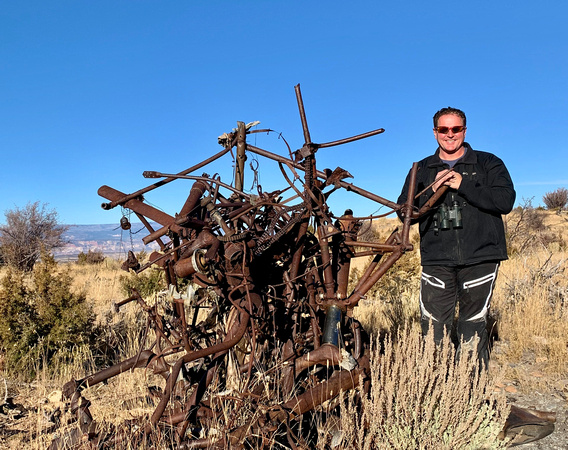

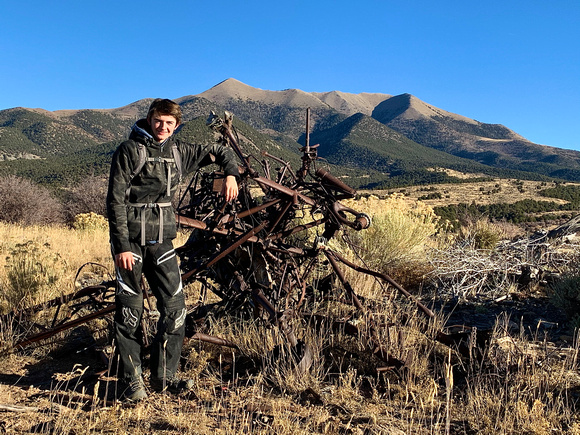

Lorin Lavar Johnson was a highly decorated World War II pilot. He was awarded the Purple Heart, the Distinguished Flying Cross, the Silver Star, the French Croix de Guerre, the Soldier’s Medal, and the Air Medal. He is recognized prominently in the Utah Aviation Hall of Fame. He was on active duty during the Korean War and was therefore listed as Killed In Action, although his crash occurred stateside. He was a hero that answered the call to the service of our country, and then, on November 30, 1950, he and his passenger paid the ultimate price due to unfortunate circumstances, bad timing, and loss of control.
After researching, finding (multiple attempts and many many miles in between - just ask my son), and finally standing at the crash site, I personally believe Lorin Johnson could have survived his “bad day” if he could have maintained control. It was very unfortunate where the fuel starvation occurred. Definitely an epic “bad day” with Murphy working overtime! With the noted locale, there wasn’t much Lorin Johnson could have done to prevent a crash. There just wasn’t enough time to get the engines restarted. But maybe he and his passenger could have survived a controlled crash. By stalling the aircraft into the trees in a nose-high controlled attitude, their survival rate would have been exponentially higher. However, that would have meant a completely different mindset - a commitment to crash (And who wants to do that?) Lorin Johnson wasn’t thinking that way either. He was desperately trying to save it and keep it flying. He came surprisingly close. But his “bad day” refused to yield. Low altitude, low airspeed, high terrain, high work load, stress, frustration, and distractions consumed all his thoughts and attention. The aircraft quit flying, rolled over, and succumbed to the unmerciful harshness of gravity. Tragically, Lorin Johnson lost control.
There is no way to prevent “bad days”. We can plan and prepare all we want, but unexpected interruptions will always occur. Hassles and problems will always lurk in the shadows, ready to pounce. However, there is a way to handle those “bad days” and deal with “bad luck”. No matter what happens, above all else, maintain CONTROL. Rage, frustration, disappointment, and stress do not rule us. We rule them. Maintaining CONTROL is about keeping our priorities straight. Seriously, what is really important? Maintaining CONTROL is about keeping the right perspective.
Throughout the Bible, there are many stories that demonstrate the concept of maintaining CONTROL. In Genesis, Joseph was betrayed by his brothers, thrown into a pit, and sold into slavery. I would classify that as a “bad day” and yet Joseph later stated to his brothers, “You intended to harm me, but God intended it for good to accomplish what is now being done, the saving of many lives.”
Genesis 50:20 NIV
In the Gospel of Luke, another story reminds us about priorities. Martha opened her home to Jesus. She busily made preparations and was completely distracted while her sister, Mary, sat at the Lord’s feet and listened. Martha became frustrated and angry and then complained to Jesus that she was doing all the work. Jesus responded, “Martha, Martha, you are worried and upset about many things, but few things are needed—or indeed only ONE. Mary has chosen what is better, and it will not be taken away from her.”
Luke 10:41-42 NIV
There once was a man named Simon of Cyrene that made a long and arduous journey from Cyrene on the north coast of Africa to Jerusalem. His religious pilgrimage to Jerusalem was inspired by the Passover season, and his plans included devoting much time to religious activities at the temple. Enroute to the temple, Simon found chaos erupting in the streets. Shouldering in for a closer look, he saw a beaten and bloody man staggering along carrying a heavy cross. Suddenly, a Roman soldier grabbed Simon and ordered him to carry the cross. Simon pulled back. He shook his head. He had no desire to be associated with the disgusting event. He didn’t want the man’s blood all over him. He cringed and pleaded with the soldier to let him go on to the temple. Yet, the Roman soldier was adamant. “You will carry the cross!”
Simon reluctantly reached for the blood-stained cross. This is not what he had planned. “What a bad day,” he whispered under his breath as he shouldered the burden and followed the man to Calvary.
As scripture unfolds in the New Testament, there are obscure clues and hints concerning what later happened to Simon. What Simon thought initially to be his worst day filled with unplanned humiliation and deep frustration, he later learns was his highest honor. He learns there is much more to this man that was hung on the cross and crucified. “He truly was the Son of God!” Simon is there during Pentecost and is saved, and then returns to Africa where he regales his wife with the entire story. She comes to know the Lord and becomes a second mother to the apostle Paul. Simon’s sons, Alexander and Rufus, accept the Good News of the Gospel and later become outstanding leaders in the early church in Rome. Was it really a “bad day” for Simon or was God orchestrating everything for the “good”?
I really think “bad days” and “bad luck” can be countered effectively by maintaining CONTROL which means that
Christ
Only
Needs
To
Rule
Our
Lives
Nothing else rules and nothing else matters. Rage, anger, frustration, resentment, disappointment, distractions, stress, and anxiety do not rule. Only Christ rules, and within that simple declaration, peace that surpasses understanding is found. Maintain CONTROL! If we keep that perspective and live that mantra, Murphy’s Law becomes an erroneous hypothesis that we can disregard. “Bad luck” is then just an opportunity to focus more intently on Christ in our lives.
In the Book of Numbers, the Israelites experienced an infestation of poisonous snakes in their camp. Many began to die so a bronze serpent was raised upon a pole. The Israelites were supposed to look to the serpent on the pole in order to survive the snakebites. At first glance, that story seems unrelated to the idea of maintaining CONTROL and keeping Christ first in our lives, but that bronze serpent on the pole foreshadowed Christ on the cross. When we get snake bit due to sin or experience “bad luck”, we are supposed to look to Christ and remember what He did for us upon the cross. That act of faith will restore us, and then we can boldly proclaim Romans 8:28;
“And we know that in all things God works for the good of those who love him, who have been called according to his purpose.”
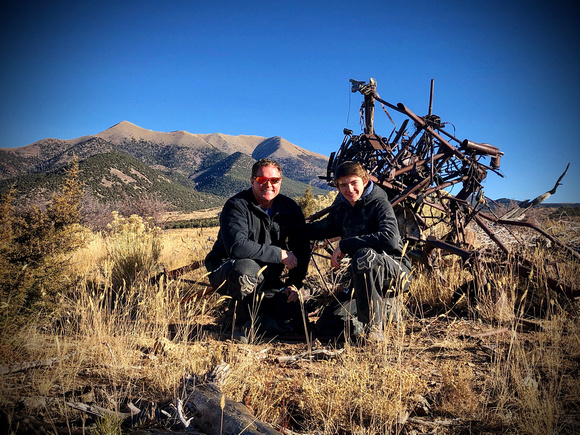

Get out there and enjoy the gift of life, and always remember that when the engines quit or threaten to flameout just maintain CONTROL.